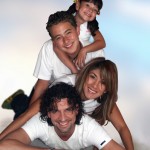
My husband and I went to a great vacation location for our honeymoon, a place called Misasa, near Osaka, Japan. It contains an excellent assortment of great getaway to-dos. We need a break from the hectic schedule sometimes so as to re-charge. It’s like running any machine, like a car, for example, one need to schedule a time for maintenance, even if it’s a great hassle to do so and often disrupt the natural flow of your schedule.
To choose the details of your holiday getaway, remember to factor in – just about everything – because the 21st-century life doesn’t give you that many opportunities for these holidays, it is very important to make the most of it.
Most of you have seen our six dimensions of wellness page. How can you apply each category when planning your holidays?
(1) Physical Wellness
The typical style of “going on a tour” is actually quite exhausting. If that is your intention, I wouldn’t discourage it. Often times, I’ve seen friends complain about how tired they are after the trip, but they usually gained a lot in terms of sightseeing opportunities or outdoor activities during their trips.
In contrast, what can one do to gain physical wellness through this “recharge” process?
Relax Oriented Tour: Usually, I see 3 different kinds of vacation motivations:
- Being a tourist in various locations (doing things the locals won’t usually do more than once, like going up the Eiffel Tower),
- Becoming truly submerge into local life (some people might like going on a farm in some remote location and give the locals some help, to experience the life away from the usual city life;) and
- Having a relaxing vacation (maybe a cruise, or a tropical resort).
Obviously, the last choice is very directly helping a physical recharge process. Spend some time in a spa, get a tan on a beach, read a book at the deck of the cruise ship swimming pool, meditate in a temple visit, jog under an endless row of Sakura trees, etc.
Learn about the healthy habits of a different culture: In some places, the people there know how to take care of themselves in aspects that are different from you. Suppose you live in the hustle and bustle city life, going on a relaxing trip in a rural region in Japan, one gets to experience great food (delicious yet still healthy food) at a hot spring resort. A fifteen-course meal is certainly filling, yet none of the food is excessively oily. The way they work vegetables into their cuisine is very natural, and kids don’t feel the usual way – “mommy is feeding me icky vegetables”.
(2) Occupational Wellness:
Sure, if you a writer, any new fresh experience is great. If not, perhaps just being away from your job for a week can be helpful? But why does it help? Sometimes, it’s good to take the time to be away from your job because this may be a good time for you to reflect on your current job situation. If I ask you now, are you satisfied with your job situation? Some may say yes, and that’s good.
Ask yourself again during your vacation. Maybe you’ll have a different response.
The “current” situation changes, and your mindset changes; new ideas come in, and it can come from many different angles. You were satisfied with your life’s routine day-to-day expenses. But obviously, you are spending slightly more during your vacation, so are you truly satisfied with your salary? Maybe you want to push more to be able to contribute more to your work once you go back? Maybe the answer to that question changes. The nice life, even for a few days, makes you truly be honest and say to yourself that maybe I don’t really like my job. Maybe there are things that you are stuck on at your workplace. Once you are “outside”, you can think of a solution easier.
So having said all this, how do you encourage this reflection? There is only one answer, and it is “spare time”. This can be on the plane. Sometimes, during this long flight, one can really spend some time to reflect. Personally, it is difficult as I spend time sleeping in the flight… Alternatively, mornings at vacations are great, especially when the tourist attractions are not opened yet. Soak in the atmosphere, yet without some “target”. Just relax and let your mind do its own things. Bring a notebook to write with. Don’t force it. Take notice of everything around you. Look at it, feel it, and let it stimulate your mind freely.
(3) Social Wellness:
Obviously, trips are great for meeting new friends. Suppose you are taking a tour, you can often meet people where you otherwise wouldn’t come across in your regular circle (family, neighbors, colleagues, etc.).
I encourage taking the opportunity not to meet friends from your own country, but rather from all over the world. You can meet people from your own country by doing anything in your home country, such as go to bars, join a club, do some volunteer work, so why do you need to do it on a trip?
The easiest way to meet new friends from different backgrounds is to take local tours! When taking a local tour, you can meet people possibly from all over the world. Start some simple conversation with your new friends. For example, all of you know only a little bit about what’s going to happen on the trip, so it’s a great way to start conversations about what you wish to see during this tour. With the ease of staying in touch nowadays, it’s great to meet new people, then start connecting and branch out to people around the world.
If not to make new relationships, maybe you can think about improving on your current ones.
Who are you planning on going with? A family gathering trip is great and can be greater if all members can spend time planning together. Each member contributes their thoughts and preferences to what the trip should be, giving a common goal for the family to work on the dinner table that can go on for weeks, even months.
(4) Intellectual Wellness:
Anytime to see new things is a learning experience.
Even on a relaxing trip, there should be a balance between relaxing on a cruise and getting off to see some destinations along the way. Learn the culture, history, and everything else the destination has to offer. Maybe spend some time talking to the locals whenever you have a chance. There is no limit to the width of what you can learn – For example, you can go for the art of architectural design and beyond! Let your mind open to any new experience.
(5) Spiritual Wellness:
Pilgrim trips to Jerusalem or Tibet is obvious if that is your thing.
Otherwise, you can also spend time reflecting on your values. I recommend trips to visit places where you can connect to nature, unlike the zoos where everything is caged. Breathtaking places like Niagara Falls as well as rich cultural places like the pyramids or the Great Wall are great in inducing reflections. Do more than putting a check mark of “I’ve been here”. Soak in the sights, sounds, flood your senses. Boom! How do you feel about coming back home and becoming a white beard Zen Master? =P
(6) Emotional Wellness:
Most importantly, do anything needed to recall the true thoughts throughout this trip. For example, document your experiences, take photos with Family, keep a journal, make recordings, etc. Do anything that can draw out your emotions and induce you to get in touch with your feelings both during your trip and afterwards when you revisit your memory by looking back at your various documentation. Take back anything you can in terms of experiences. Some souvenirs are good, but just remember, avoid any IED-looking alarm clocks…Hahaha
How do you achieve all these amounts of thinking in a short trip? While letting the trip to give you the satisfaction of seeking for happiness outside of you, please also reserve some spare time to allow your mind and soul seeking for happiness within you.
Remember not to force it. But always keep some spare time open for the process of reflection. Let your mind and soul explore all the new experiences.
For example, during our trip, I realized the need of human resources changes during some time of reflection during hot spa therapy; treated various bumps and bruises by soaking in hot spa and getting massages at the resort; spent time in a honeymoon trip that both my spouse and I loved; read a large section of a book called “7 Habits of Highly Effective People”; experienced the culture of rural Japanese, Japanese city life, and Japanese Buddhism; wrote an article about happiness around an audiobook that was available on the plane.
With love,
Cecilia Or
Always Remember W.H.Y.
Be Well, Be Happy, Be You
![]()






